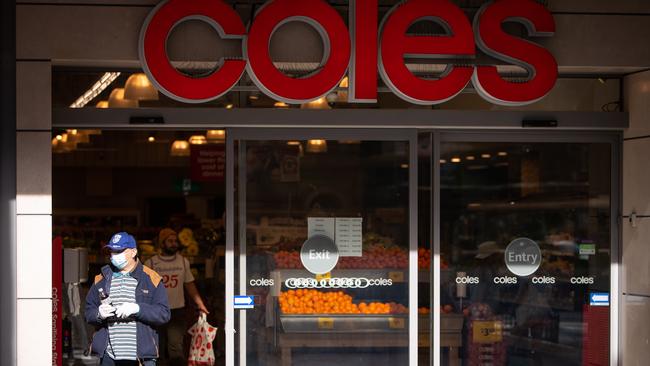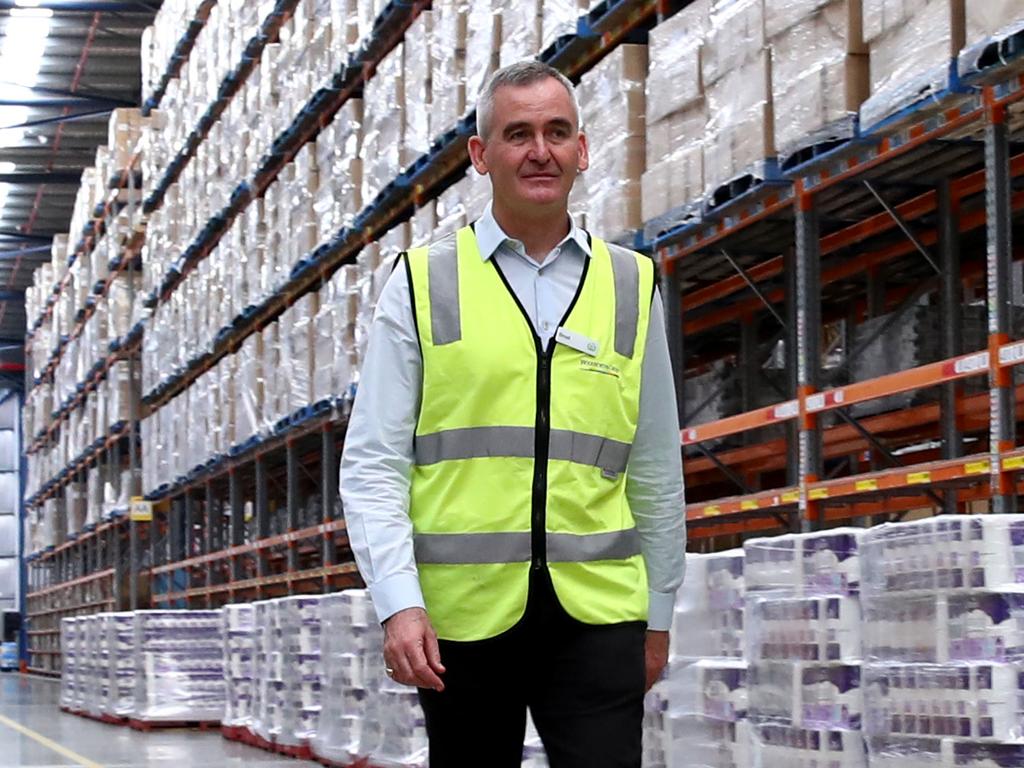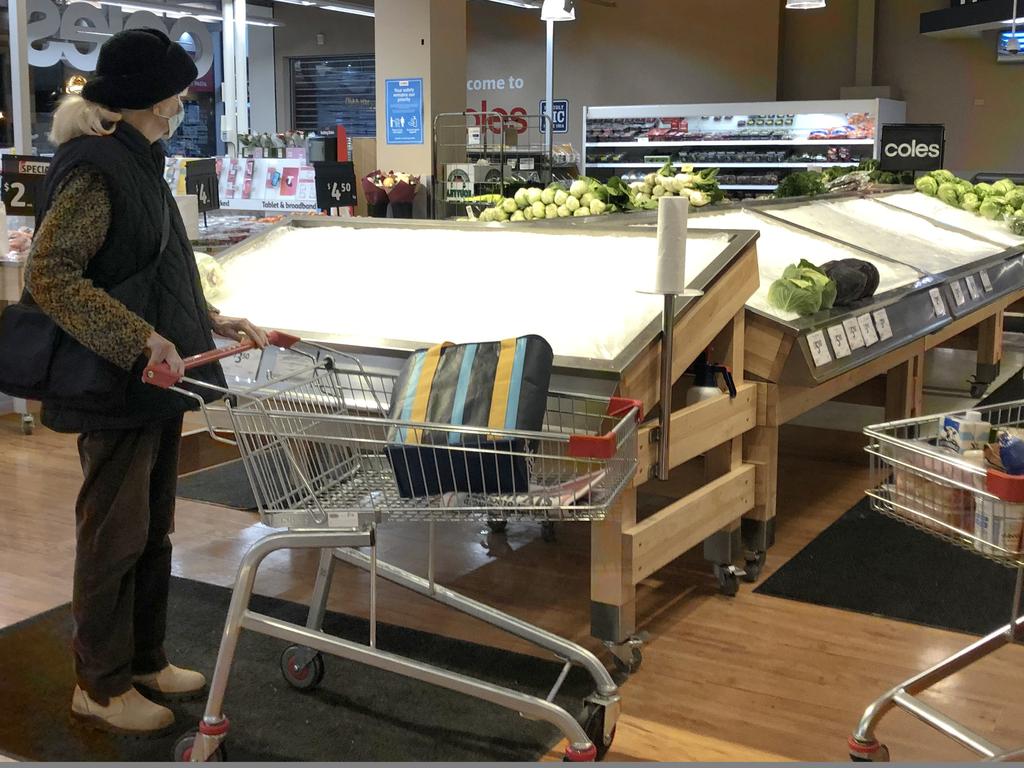Victoria’s stage 4 restrictions bring big demand for supermarkets but panic buying in check, says Coles’ Matthew Swindells
Victoria’s stage 4 restrictions have seen supermarket demand surge, but panic buying has remained in check, says Coles’ COO Matthew Swindells.

Coles chief operating officer Matthew Swindells said there has been an elevated level of demand at Victorian supermarkets, with issues with the supply of meat continuing.
But buying was not at the levels experienced in March when shoppers stripped toilet paper from the shelves, he said.
Nevertheless, Mr Swindells confirmed a rocketing demand for pantry staples such as flour and spices as more consumers cooked at home.
“We have seen panic buying in the past and at this stage the demand is still elevated across the supermarkets. People are coming now only once a day in Victoria, they are coming in well prepared … and it’s a higher level of demand,’’ Mr Swindells told ABC Radio on Friday.
With long supply chains, meat was a particular concern for Coles, Mr Swindells said.

“The key issue at the moment is meat. The uncertainty of what was going to happen with abattoirs and meat processors, particularly across the weekend, led to a spike in buying in the meat category that we are now working through to recover.
“We continue to work with the processors and work across the supply chain to recover that quickly.
“But I wouldn’t say this is at ‘toilet paper’ levels of panic buying we have seen in the past.’’
Home cooking was making a big comeback in Victoria, Mr Swindells said.
“If you look at categories like flour, sugar, eggs, they have definitely lifted. Spices have lifted, I think people have got time at home are now sitting down and working out what to cook for dinner, there is a definite shift.”
Supermarkets were filling the gap left by the unavailability of other food outlets like restaurants and cafes, he said.
Mr Swindells said Coles, the nation’s second largest supermarket, was in a better position than it had been in March, when the first wave of panic buying occurred as COVID-19 swept through Australia. Supermarkets had learned a lot from that experience and brought in new protocols and systems to support supplies, he said.

Mr Swindells’ comments came after CEO of Coles’ chief rival Woolworths, Brad Banducci, said he was confident Victoria and the rest of the country had avoided food shortages caused by stage 4 lockdown restrictions.
Mr Banducci spoke on Thursday after a hectic 48 hours of meetings, lobbying and phone calls won government concessions to ease supply chain constraints.
Mr Banducci had warned that hamstrung supply chains in Victoria would have implications for the nation as the state was a key logistics hub for Australia’s $90bn grocery sector.
The Supermarkets Taskforce, made up of Woolworths, Coles, Aldi and wholesaler Metcash, had been engaged in deep discussions with state and federal government representatives, urging them to relax some of Victoria’s harsh restrictions.
Although aimed at reducing the spread of COVID-19, the restrictions could have triggered food shortages, panic buying and even more store traffic as people were forced to shop more often.
The stage 4 regulations included forcing retailers such as Woolworths and Coles to cut their distribution centre staff by 33 per cent, with the supermarkets warning this would have a calamitous impact on the supply chain.
Although retailers were still working on fixing supply issues for red meat due to tough regulation of abattoirs, Mr Banducci said the leeway provided by the Victorian government on Thursday would help ease supply constraints.
“Absolutely. It is very helpful for the government to be very pragmatic in terms of the balance (between) the need for all of us to absolutely practise a COVID-safe policy but also to make sure we have enough food on the shelf,’’ he told The Australian.
“The only the thing I need to do more work on and our team is working on is red meat and obviously that is a challenge, with the demand surge we have had. We still have got more work to do there.”
Initially there was some resistance by the government to requests for a revised stage 4 ruling, with Victorian Treasurer Tim Pallas knocking back requests at a special Business Council of Australia dial-in where he said: “It is always going to be difficult. Extreme times call for extreme measures.”
The supermarkets warned repeatedly that if the government did not budge they would consider rationing, restricted trading hours and restricted online deliveries.
They have now won concessions. The Victorian government will allow supermarkets more time to get plans in place to meet new limits on how many workers they can have at sites, with a Friday deadline now pushed back to midnight Sunday.
The state government will also allow the supermarkets to spread the 33 per cent reductions in workforces across their operations, not just focused on distribution centres. For Woolworths it means instead of being forced to remove 1300 team members from its supply distribution workforce, it can spread that cut across other functions such as merchandise, back office and administration.
To further ease the burden, and free up staff to work in the supply chain, Woolworths will also stop all stocktake activity for six weeks, end management and support roles from working out of distribution centres and its state support office, and ask vulnerable team members (70 years old and over or those with medical conditions) to stay home with full pay.
Some of the changes were helped by the push-back from the Supermarkets Taskforce about the heavy stage 4 restrictions.
“We (Supermarkets Taskforce) have met many times in the last four days.
“We are all very supportive and grateful that the government has been constructive in their dialogue and we are all agree on their aspirations and objectives so it’s making sure it is fit for purpose,’’ Mr Banducci said.
“We do have enough food in the supply chains to meet the needs of the country but if we found a situation where the warehouses were materially compromised for a long period of time clearly there are flow-on effects, particularly given we have one of our national distribution centres in Melbourne.”
A Coles spokesman said the supermarket thanked the government for clarifying measures that would apply to supply chains under stage 4 restrictions.
“Coles will prioritise its store and distribution centre teams to ensure we are able to maintain necessary supply to our stores while complying with these guidelines.
“The health and safety of our team members and customers remains our highest priority and Coles has worked with government experts to implement a range of enhanced safety measures at all Coles sites,’’ the spokesman said.
These included increased frequency of deep cleans, additional cleaning of high-traffic areas, adjustments to shift times to maintain separation between team members, installation of thermal imaging cameras and contactless thermometers to check the temperature of team members and transport providers, as well as sanitiser stations at all entrances, exits and throughout the facility.
“We also thank the government for the updates announced today to the stage 4 restrictions applying to the meat, seafood and poultry processing sectors, which will reduce the potential impact on food supplies for Victorians over the next six weeks,” the spokesman said.
“To help us manage demand, we have implemented a temporary two-pack limit on purchases of chicken, pork, lamb, beef, sausages and mince in our Victorian and NSW border stores. We will continue to monitor stock levels and we thank customers for purchasing only what they need.”






To join the conversation, please log in. Don't have an account? Register
Join the conversation, you are commenting as Logout